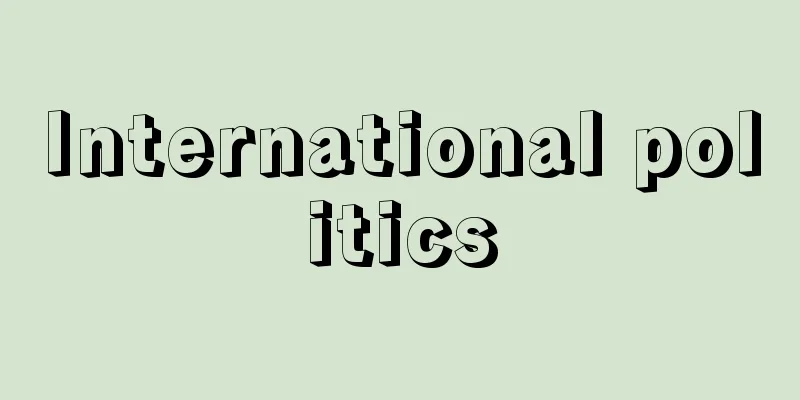International politics

|
When we look at the relationship between nations in terms of political relations such as diplomacy and war, we can say that such international politics is as old as the establishment of multiple nations throughout history. However, the characteristics of modern international politics are significantly different in many ways from international politics of the past. What is generally understood as international politics is the nation-state system that was established in Europe from the 16th century onwards, but that system itself has undergone significant change, and its raison d'être is being called into question. [Takashi Saito] historyWhen a social group such as a nation, city, or tribe came into contact with another group, trade, diplomacy, or war broke out, and customs or laws were formed to regulate their mutual relations. This situation was also seen in ancient times, among the poleis of Mesopotamia, China, and Greece. However, the reality and nature of international politics in ancient times differed in several respects from that of modern times. In ancient times, the scope of international politics was limited to local civilizations, and diplomatic relations were not permanent, but temporary and accidental. In medieval Europe, the universalism of the Catholic Church and imperial power dominated countries, and there was no concept of national sovereignty. It was in the 16th century in Europe that the modern international society was established, in which independent sovereign states existed side by side, maintained permanent diplomatic relations as equals, and were subject to common customs and international law. Diplomatic practices had already begun to take root in Northern Italy around the 13th century, but these Italian practices spread to other European countries, becoming established by the 16th century and reaching completion with the Treaty of Westphalia in 1648. This international system is called the modern international society or the Western European state system. It is based on the idea of national sovereignty and international law, but at the same time it is based on a balance of power, and if the balance is perceived to have been upset, it is a system in which war can be resorted to. This Western European state system expanded its scope to non-European countries, and by the second half of the 20th century it had come to cover almost the entire land area of the earth. This nation-state system can be said to have reached formal completion. In the Western European state system, diplomacy evolved from court diplomacy to bureaucratic diplomacy, and wars changed from mercenary wars to wars with conscripted armies, and then to total wars, leading to the threat of all-out war with nuclear weapons in the second half of the 20th century. However, on the other hand, the formation of international wartime law and the illegalization of war progressed, and various organizations were born between and beyond nations. Currently, there is a rise in the anti-nuclear movement and growing international public opinion calling for disarmament. Furthermore, capitalism has grown without the existence of colonies. Particularly during the age of imperialism in the second half of the 19th century, the so-called imperialist powers divided up lands from the interior of Africa to the islands of the Pacific. In response, rebellious movements among the peoples of the colonies gradually developed, and by the end of World War II, the colonies had technically disappeared and become independent countries. However, the economic gap between these emerging nations and developed countries is significant due to the legacies of the colonial era and internal political instability, and this "North-South problem" has become a focal point of future international politics. [Takashi Saito] DynamicsIn the Western nation-state system, national interests were considered the greatest driving force in international politics, and nation-based conflicts were institutionalized, replacing the religious and tribal conflicts of ancient and medieval times. The idea of national interests is based on nationalism, and the pretense of a system of nation-states has dominated international politics since the 17th century. The nation is the highest entity, transcending all other domestic organizations, and is justice on earth. War is a clash between justice and justice, and its right or wrong is determined by the outcome of the war. This classical view of the nation still persists today, and is a distinctive feature of international politics that differs from domestic politics. On the other hand, international organizations such as the United Nations recognize justice that transcends nation states in international conflicts, even if they are not thorough, and non-governmental organizations have appeared in a variety of fields. Thus, the nation state itself is no longer the highest standard today, but unlike domestic societies, there is still no equivalent to a central government. Moreover, even though they are called nation states, the superpowers America, Russia, and China are all nations made up of multiple ethnicities. In the current state of the world, the distribution of ethnicities and the territorial boundaries of nations often do not coincide. Although sovereign nations are supposedly equal, there are still significant inequalities among the 180 or so nations today. The world is currently facing two trends: will it move toward integration, as in the ideal of the EU (European Union), or toward extreme fragmentation, as seen in the Pacific islands? Mutual exchange and dependence between nations is deeper than ever before, but on the other hand, tensions between the superpowers have not yet completely disappeared. Today's world is a complex landscape that cannot be explained by the logic of simple nation states. Socialism, which appeared on the international political stage after the Russian Revolution, expanded significantly after World War II, and socialist countries were established in Eastern Europe and East Asia, and later in Latin America and Africa. From a macroscopic perspective, they share almost the same ideology, but in reality, there are conflicts of interest between them, and they may or may not act as a bloc in international politics. Socialism was attractive as a way to rapidly industrialize, especially in countries that had escaped colonial rule. Regarding the relationship between capitalist and socialist countries, the idea of the Cold War, which viewed the relationship as an adversarial one, dominated both systems for a long time after World War II, but in the late 1980s, the end of the Cold War was announced between the United States and the Soviet Union, followed by the withdrawal of Eastern European countries from socialism and the collapse of the Soviet Union, which proceeded in a chain reaction. Even countries that still have socialism as their official system now advocate a market economy, and socialism is no longer an issue in international politics. From the second half of the 19th century, imperialism emerged as a policy principle in European countries, and various regions of the world were divided one after another, and non-European countries such as the United States and Japan also joined in this race to divide the world. The result of this imperialist competition was that Africa and the Pacific Islands were completely divided among the great powers. Imperialism was established on the basis of monopoly capitalism, and during this period, expansionism was intentionally adopted as a national policy. The imperialist great powers repeatedly caused wars to repartition the world, but after World War II, imperialism disappeared from the surface of international politics as a pretense. In fact, the attributes of imperialism, such as belligerence and hegemonism, and the urge to oppress other ethnic groups, have not disappeared from the world, as seen in the Vietnam War. [Takashi Saito] current situationIn World War II, the United States and the Soviet Union cooperated as an allied power, but shortly after the war, the US-Soviet conflict, known as the Cold War, surfaced. There were few neutral countries that did not belong to either the US or the Soviet camp, but after the end of the Korean War (1953), the end of the Indochina War (1954), and the Bandung Conference (1955), they gradually expanded their influence as non-aligned countries. Countries that broke away from traditional colonial dependency formed the "Third World." These countries gained international recognition for their control over their own natural resources, a phenomenon known as "resource nationalism," which indicates growing criticism of the Western state system. Most of the Third World overlap with the members of the Non-Aligned Conference, but at the same time, they are also the "south" countries in the North-South problem, and their economic problems remain difficult. Moreover, conflicts between countries belonging to the Third World, known as the South-South problem, have become more prominent in recent years. The Third World is a very complex and diverse group of countries, with some large and some small, some rich in natural resources, and some suffering from extreme poverty. In general, however, the domestic systems of these countries are insufficiently developed, and many of them are under developmental or military dictatorships, with weak political foundations. The trends of the Third World, which now holds a majority in the United Nations, will be an important key to the future of international politics. During the Cold War, the East and West blocs, which seemed to be divided into "two worlds," underwent a remarkable transformation after the 1960s. In the West, the economic development of Japan and the EC countries and the decline of the relative weight of the United States led to the loss of American political dominance. Meanwhile, in the East, a succession of countries in Eastern Europe, including China, turned away from the Soviet Union, and major international and ideological events occurred, such as the Hungarian revolution (1956) and the Czech revolution (1968). This phenomenon, which indicates the disintegration of the two blocs, is called the multipolarization or pluralization of international politics, and continues to this day. As tensions between the East and the West eased, ethnic and regional conflicts that had not previously surfaced suddenly erupted. The ethnic conflicts in Yugoslavia are a typical example. In the 21st century, the world is experiencing unprecedentedly close international exchange in all aspects of people, goods, and money. International interdependence is deepening, and the boundaries between politics and economics are becoming blurred. In this era, international politics today is in a state of chaos, with new factors emerging due to changes in world history. Internationalism, as symbolized by the United Nations and NGOs (non-governmental organizations), appears to dominate on the surface, but nationalism is an underlying phenomenon in some regions. Although disarmament appears to be the trend in the world, it is not uncommon to see power politics of nations still being exercised. It is impossible to predict how international politics will change in the future, but ultimately it depends on the independent formation of the will of the peoples of each country to inherit the idea of peace as a historical heritage of humanity and pool their wisdom to promote the welfare of humanity. [Takashi Saito] "Lectures on International Politics, 5 volumes (1989, University of Tokyo Press)" "Lectures on World Politics Through the Centuries, 6 volumes (1993-94, Nippon Hyoronsha)" Source: Shogakukan Encyclopedia Nipponica About Encyclopedia Nipponica Information | Legend |
|
国家と国家の関係を外交や戦争などの政治関係についてみるならば、そのような国際政治は歴史上複数の国家の成立とともに古いということができる。しかし、現代の国際政治の特徴は、過去の国際政治といろいろな点で大きく異なっている。一般に国際政治として理解されているものは、ヨーロッパの16世紀以降成立した国民国家体制であるが、その体制自体が著しく変動し、その存在理由が問われているのである。 [斉藤 孝] 歴史国家・都市あるいは部族などのある社会集団がほかの集団と接触し、そこに交易・外交あるいは戦争が発生し、相互の関係を規制する慣習または法が形成された。このような事態は、古代においても、メソポタミアや中国およびギリシアのポリスの間にみいだせる。しかし、古代における国際政治の実態と性格はいくつかの点で近代のそれとは異なっている。古代において国際政治が形成される範囲は局地的な文明圏を限度としており、また、外交関係といっても恒常的ではなく、一時的・偶然的なものであった。中世ヨーロッパにおいてはカトリック教会および皇帝権の普遍主義が諸国を支配しており、国家主権という概念もなかった。独立した諸主権国家が並立し、互いに平等なものとして恒常的な外交関係を保ち、共通の慣習および国際法に服する近代国際社会が成立したのは、16世紀のヨーロッパにおいてである。 外交上の慣行はすでに13世紀ごろから北イタリアで確立し始めていたが、このイタリアにおける慣行がヨーロッパ諸国に広がり、ほぼ16世紀には定着し、1648年のウェストファリア条約によって完成をみた。この国際体制を近代国際社会とも西欧国家体系ともよんでいる。それは、国家主権の観念と国際法とを柱とするが、同時に勢力均衡を基礎としており、ひとたび均衡が破れたと意識されると、戦争に訴えうるような体系であった。この西欧国家体系はその範囲を非ヨーロッパ諸国にも拡大し、20世紀後半にはほとんど地球上の陸地の全域を覆うに至った。このような国民国家体制は形式上は完成をみたということができる。 西欧国家体系のなかで、外交は宮廷外交から官僚外交へと展開し、戦争も傭兵(ようへい)戦争から徴兵制軍隊による戦争、さらに国家総力戦へと推移し、20世紀後半には核兵器による全面戦争の危機が叫ばれるに至った。しかし、一方では戦時国際法の形成や戦争の違法化も進み、さらに国家間の、および国家を超えた諸組織も生まれている。現在においては反核運動の台頭や軍縮を求める国際世論も高まっている。 また、資本主義は植民地の存在を不可欠のものとして成長してきた。とくに19世紀後半の帝国主義の時代にはアフリカの奥地から太平洋の島々に至るまでいわゆる帝国主義列強によって分割されたのであった。これに対して植民地諸民族の反抗運動がしだいに発展し、第二次世界大戦後に至っては、植民地は形式上は消滅して独立国となった。しかし、これら新興諸国は、植民地時代の遺産および内政の不安定などによって先進諸国との間の経済的格差が著しく、「南北問題」として今後の国際政治の焦点となっている。 [斉藤 孝] 動態西欧国家体系において国際政治を動かす最大の要因と考えられたのは国家的利益national interestsであり、古代・中世の宗教的・部族的対立にかわって国家を主体とする対立が制度化した。国益という観念の基礎にあるものがナショナリズムであり、諸民族国家の体系というたてまえがほぼ17世紀以降の国際政治を支配した。国家は国内におけるあらゆる団体を超えた最高の存在であり、地上における正義である。戦争は正義と正義の衝突であり、その正否は戦争の勝敗によって決定される。このような古典的というべき国家観は今日なお持続しており、国内政治と異なった国際政治の特色となっている。 しかし、反面、国際連合のような国際組織は、不徹底ではあるが、国際紛争においては国家を超えた正義を認め、また、非政府組織が多様な分野に登場している。こうして国家そのものが今日では最高の基準ではなくなっているが、国内社会と違って依然として中央政府にあたるものはできていない。 しかも、民族国家といっても、超大国であるアメリカとロシアさらに中国は、いずれも多民族からなる国家である。世界の現状では、民族の分布と国家の版図とが一致しない場合も多い。主権国家がたてまえとして平等であるといっても、今日の180余の国家の間には著しい不平等が存在する。世界はEU(ヨーロッパ連合)の理想像のように統合に向かうのか、あるいは太平洋の島々にみられるような極度の細分化に向かうのか、二つの契機が共存しているのが現状である。国々の間の相互の交流および依存はかつてないほどに深まっているが、他方、超大国の間の緊張は、まだまったく消滅してはいない。今日の世界は単なる民族国家の論理では説明のつかない複雑な様相を呈している。 ロシア革命以後国際政治の舞台に登場した社会主義は第二次大戦後著しく拡大して、東ヨーロッパと東アジアに社会主義国家が成立したが、その後ラテンアメリカおよびアフリカにも社会主義国家が生まれた。それらは巨視的にはイデオロギーをほぼ同じくするが、現実的には相互の利害の対立があり、国際政治上一つのブロックとして行動する場合もあり、行動しない場合もある。社会主義は、とくに植民地支配を脱した国々においては急速な工業化のための方途として魅力をもっていた。資本主義諸国と社会主義諸国の関係については、これを敵対関係においてとらえる冷戦という考え方が第二次大戦後久しく双方の体制を支配したが、1980年代後半、アメリカとソ連の間に冷戦の終了が宣言され、ついで東ヨーロッパ諸国の社会主義からの離脱、ソ連の解体が連鎖反応的に進行し、いまなお社会主義を公的な体制としている国も市場経済を唱えており、社会主義は国際政治の争点ではなくなった。 19世紀の後半からヨーロッパ諸国において帝国主義が政策原理として台頭し、世界諸地域は相次いで分割され、アメリカ・日本の非ヨーロッパの国もこの世界分割競争に参加するに至った。アフリカおよび太平洋諸島があますところなく列強に分割されたのはこの帝国主義競争の結果である。帝国主義は独占資本主義を基礎として成立しているものであり、この時期においては国家の政策として意図的に拡張主義がとられたのであった。帝国主義列強は世界再分割戦争を再度にわたって引き起こしたが、第二次大戦以後帝国主義はたてまえとして国際政治の表面から姿を消した。事実上なおベトナム戦争にみられたように帝国主義の属性である好戦主義・覇権主義や、異民族に対する抑圧の衝動は世界から消滅していない。 [斉藤 孝] 現状第二次大戦においてアメリカとソ連は連合国として協力したが、戦後まもなく冷戦とよばれる米ソ対立が表面化した。米ソ両陣営に属さない中立諸国の数は少なかったが、朝鮮戦争の終結(1953)、インドシナ戦争の終結(1954)、バンドン会議(1955)を経てしだいに非同盟路線として勢力を拡大してきた。従来の植民地的従属から脱却した諸国は「第三世界」を形成した。これらの国々が「資源ナショナリズム」とよばれるような自国内の天然資源に対する支配を国際的に認めさせたことは、西欧国家体系に対する批判の高まりを物語るものであった。第三世界は大部分が非同盟会議のメンバーと重複しているが、同時に南北問題における「南」の国々であり、その経済的諸問題は依然として困難な問題である。しかも、最近においては南南問題といわれる第三世界に属する国どうしの紛争が目だつようになった。ひと口に第三世界といっても、その内実は、大国あり小国あり、資源を豊富に所有する国もあり、著しい貧困に悩む国もあるというぐあいに実に複雑多様であるが、概して国内体制の整備が不十分であり、開発独裁や軍事独裁の下に置かれている国が多く、政権の基礎が弱体である。国連において多数を占めるに至った第三世界の動向は、国際政治の将来にとって重要な鍵(かぎ)となる。 冷戦下に「二つの世界」に分かれたようにみえた東西両陣営は、1960年代以降著しい変貌(へんぼう)を遂げた。西側においては、日本およびEC諸国の経済発展とアメリカの相対的な比重の低下に伴って政治的にもアメリカの優位は失われた。一方、東側でも、ソ連から離反する国が中国はじめ東ヨーロッパに相次ぎ、ハンガリー事件(1956)やチェコ事件(1968)のような国際的にも思想的にも重大な事件が起こった。このような両陣営の解体を示す現象は国際政治の多極化あるいは多元化とよばれ、今日まで継続している。東西間の緊張が緩和するとともに、それまで表面化しなかった民族間の紛争、地域的な紛争が突然噴出した。ユーゴスラビアにおける民族紛争はその代表的な例である。 21世紀となって世界は、人、物、金のあらゆる面で歴史上かつてない密接な国際交流を実現しつつある。まさに国際的相互依存が深まっており、政治と経済との境界もあいまいになっている。このように時代にあって現在の国際政治はまさに世界史の変動による新たな要因が出現して混沌(こんとん)とした様相を呈している。国際連合やNGO(非政府組織)に象徴される国際主義が表面的に支配的であるかにみえるが、一方、ナショナリズムが地域によっては現象の底流に存在する。軍備縮小が世界の大勢であるかにみえながら、国家のパワー・ポリティックスが依然として発動されることが珍しくない。今後、国際政治がいかに変動するかは予断を許さないが、結局のところ、人類の歴史的な遺産としての平和思想を継承し、人類の福祉を増進するための知恵を集合するような諸国民の主体的な意志形成にかかっている。 [斉藤 孝] 『『講座国際政治』全5巻(1989・東京大学出版会)』▽『『講座 世紀間の世界政治』全6巻(1993~94・日本評論社)』 出典 小学館 日本大百科全書(ニッポニカ)日本大百科全書(ニッポニカ)について 情報 | 凡例 |
>>: The International Council of Sports and Physical Education
Recommend
Arrived - Arrived
In medieval samurai society, the term referred to ...
Ongai (Sea mussel) - Ongai
...The name Karasu-gai comes from its color. In t...
Simplification - Yakubun
When you have a fraction, you can divide its nume...
Dominance (English spelling)
In social relations, a subordinate relationship i...
《Mémoire des pensées et sentiments de Jean Meslie》 (English notation) Memoire des pensées et sentiments de Jean Meslie
…He was a stubborn priest who refused to bow to t...
Sanseki - Sanseki
A name given to three calligraphers of the Heian ...
Nemophila (English spelling)
A general term for the genus Nemophila in the fami...
Gamakaka - Gamakaka
…However, a scale can be recognized even if the a...
Miracle
…Also in the same year, he became a student of To...
Leontes
…the river flows through southern Lebanon. It is ...
Leafy order - Enyo-moku
...When this final developmental form is ingested...
Olivine norite - Olivine norite
…The colorless minerals are mainly plagioclase, w...
Praphat Charusathien (English)
...The construction of higher education instituti...
Katsuragi Nao - Katsuragi's Attack
…Two clans took the place name of Katsuragi as th...
Income - income
It refers to the remuneration received in exchang...









